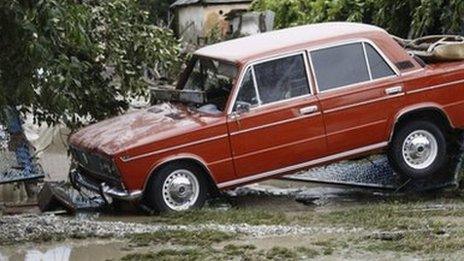Into the deep squeeze
- Published

The Centre for Public Policy for Regions says the most painful cuts have still to come
The weather forecast isn't much use beyond a five-day horizon. So beware the economist bearing forecasts for 28 years from now.
One of the advantages, of course, is that, when the time comes, no-one's likely to remember. There will be other concerns by then to take away from recriminations against aged academics for getting their assumptions wrong.
If you go back 28 years, who's being blamed for getting it wrong in 1984? Oh no, hang on... Margaret Thatcher is, still. That theory may need some work.
Anyway, the Office of Budget Responsibility has peered towards the distant horizon and taken some relatively easy guesses about life expectancy. Pension costs follow from that, and you can assume an ageing population will carry higher costs in health and social care.
That's not to criticise elderly people now: it's an expectation that my generation will bring big demands on public services as we age.
Less taxing times
None of that should surprise us. But the OBR is warning of a big gap in public finances opening up on the other side of the ledger. The tax take can't be assumed to keep on giving as it has.
Whitehall's official, independent budget adviser says that globalisation is going to make it more difficult to sustain levels of Value Added Tax on transactions, as a lower share of spending goes on taxable goods.
It also warns that corporation tax isn't going to give what it has.
That's based on experience of recent years, when not only Ireland has cut tax competitively to attract business. Britain is one of the countries taking the percentage take down, from 30% towards 22% by 2014.
And of course, that plays into one of the big arguments made for Scottish independence; that Holyrood could use corporation tax powers to carve out competitive advantage.
Not only is that doubtful while the European Union is looking to iron out tax differences. It's also got to take account of competitive tax cutting elsewhere. Within three decades, we're being warned that corporation tax will have to be replaced with other revenue streams.
Milking the North Sea
And then there's offshore oil and gas, of particular interest in Scotland. The OBR has taken another look at the assumptions it previously used to forecast future tax take. It has downgraded its expectations of what might happen to the oil price long term. Last year, it guessed the oil price in 2040 will be up from $99 now to $206, but this year, it thinks it looks more like being $173. On such sharp and short-term changes in assumption come big changes in eventual outcome.
It has ignored the possibility that shale gas could transform the energy market dramatically, as it has already done in the US. And it has counted the cost of the tax breaks necessary to ensure companies break up a lot of old equipment which is now moving towards the end of its useful life in and under the North Sea.
Put together, the UK's oil and gas revenue is expected to come in at around half the level previously assumed. That's not a reflection on the amount of oil and gas pumped, though the price and tax regime can clearly affect that. It's a measure of how much government can reasonably assume it can cream off.
That also plays straight into the independence debate. We're told Scotland could be the sixth wealthiest country in the world, in terms of gross domestic product per head, and that there are 24 billion barrels of oil still to be pumped. But that belongs to the energy industry: it's not Scotland's wealth. And it's no guarantee of what Holyrood or Whitehall could hope to get from it.
Cuts to come
There is a shorter term horizon-scanning that's less about forecasting than about assessing the trajectory upon which we're already embarked. That's the question of the squeeze on public spending - austerity to some, consolidation to others - of how much we've cut, and how much more has yet to come.
The Centre for Public Policy for Regions has some chilling messages from its crunching of the latest numbers from the OBR. It reckons the total Holyrood budget is on track to fall between 2009-10 and 2016-17 by 18%, equivalent to £5.5bn. Of that, only £2.2bn, or 40% has been achieved.
The capital budget has already taken two-thirds of that cut. But the revenue budget, which is the bit for funding public services rather than the buildings they go in, has a long way to fall. Out of a £3.5bn cut, or 14%, the cut so far achieved, according to the CPPR, is £800m. That's less than quarter of the way through the budget decline.
That means a lot of the pain is being saved for later, and particularly for the years after the next Holyrood election. [This] "highlights a landscape of continuing financial challenges," understates the CPPR. "Indeed, it could be argued that such challenges will intensify as the low hanging fruit, in terms of efficiency savings, will already have been picked.
"Given this, 2015-16 and 2016-17 are shaping up to be two of the most painful years in terms of cuts to the Scottish resource (or revenue) budget."
That means we're storing up pain for ourselves, rather than getting it out the way early. It also plays into the electoral timetable, with a particularly harsh year in the wake of the (likely date of the) independence referendum and going into the next Holyrood election. And there's no guarantee the austerity ends a year after that.
It's just that this set of projections runs out of steam at that point. As much else besides might do.
- Published26 February 2012
- Published8 July 2012
